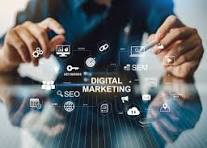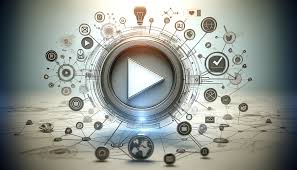The Future of Digital Marketing: Trends, Innovations, and Strategies for Tomorrow
Future of digital marketing is a dynamic force that evolves at lightning speed. What worked five years ago is already outdated, and what’s trending today might become irrelevant tomorrow. For marketers, brands, and businesses, staying ahead means not just keeping up but anticipating change.
In this blog, we’ll dive deep into what the future of digital marketing looks like: the trends shaping it, the technologies driving it, and the strategic mindset marketers need to thrive in the next decade.
1. The Rise of AI and Automation Future of digital marketing
Artificial Intelligence is no longer science fiction in marketing — it’s the engine powering smarter campaigns, hyper-personalized experiences, and efficient workflows.
In the coming years, AI will:
-
Automate repetitive tasks: From scheduling posts to analyzing vast amounts of data, AI will handle the mundane so marketers can focus on strategy and creativity.
-
Enhance personalization: Machine learning algorithms will deliver highly tailored content, recommendations, and ads based on real-time user behavior.
-
Improve customer support: AI-powered chatbots and virtual assistants will offer instant, 24/7 help, improving customer satisfaction while reducing costs.
For digital marketers, the challenge is learning how to integrate AI tools while keeping the human touch that builds authentic connections.
2. Voice Search and Conversational Marketing the Future of digital marketing
With the widespread use of smart speakers and voice assistants like Alexa, Siri, and Google Assistant, voice search is becoming a dominant way people find information.
By 2027, it’s estimated that over half of all online searches will be voice-based. This shift changes SEO strategies:
-
Content needs to be optimized for natural language queries.
-
There’s a rise in featured snippets and direct answers.
-
Local SEO becomes even more important, as people often use voice search to find nearby businesses.
Conversational marketing — real-time, one-to-one connections through chatbots, messaging apps, and live chats — complements this trend. Brands that can “talk” to customers naturally will win trust and loyalty.
3. Video Content Will Dominate the Future of digital marketing
Video marketing is already huge, but its future is even bigger. Consumers crave authentic, engaging video content — short-form, live streams, webinars, and interactive videos.
Platforms like TikTok, Instagram Reels, and YouTube Shorts prove that short, snackable videos are the future. Meanwhile, live streaming lets brands connect in real-time, building community and transparency.
Marketers need to:
-
Master video storytelling.
-
Repurpose content across multiple channels.
-
Use analytics to understand what resonates.
Expect video search to become more sophisticated too, with AI recognizing scenes and keywords within videos to improve discoverability.
4. The Metaverse and Immersive Experiences Future of digital marketing
The idea of a fully immersive digital universe — the Metaverse — once seemed futuristic. Today, major companies are betting big on it, from Meta (formerly Facebook) to Microsoft.
In the next 5-10 years, brands will create virtual stores, host events, and offer interactive experiences within immersive worlds. Augmented Reality (AR) and Virtual Reality (VR) will play huge roles in digital marketing:
-
Virtual try-ons for fashion and beauty.
-
3D product demos.
-
Virtual events and branded spaces.
For marketers, it means rethinking customer engagement. Instead of a website visit, imagine a shopper walking through your virtual showroom from their living room.
5. Data Privacy and Ethical Marketing Future of digital marketing
As technology advances, so does consumer awareness of privacy. The future of digital marketing must balance personalization with respect for data privacy.
Regulations like GDPR and CCPA have already reshaped how companies collect and use data. Cookies are being phased out, pushing marketers to find new ways to gather insights:
-
Zero-party data (information willingly shared by users) will be key.
-
Building trust through transparency will become a competitive advantage.
-
Contextual advertising — serving ads based on page content rather than tracking users — is making a comeback.
Ethical, consent-based marketing isn’t just good practice; it’s what consumers demand.
6. Content Marketing Evolves Future of digital marketing
Content remains king — but the crown has evolved. Future content marketing will be:
-
Value-driven: Consumers are overwhelmed with generic content. Unique insights, thought leadership, and genuine value will cut through the noise.
-
Interactive: Quizzes, polls, AR filters, and gamified experiences boost engagement and data collection.
-
User-generated: Brands that encourage and leverage content made by real customers (reviews, photos, testimonials) build credibility and community.
Additionally, AI-generated content will become common, but brands must ensure it aligns with their voice and maintains authenticity.
7. Omnichannel and Integrated Marketing Future of digital marketing
The lines between online and offline experiences continue to blur. Customers expect seamless interactions whether they’re shopping in-store, on an app, or browsing social media.
Future-ready marketers will:
-
Integrate channels into a cohesive strategy.
-
Use CRM and marketing automation to deliver consistent messaging.
-
Map the entire customer journey, optimizing every touchpoint.
Technologies like IoT (Internet of Things) will connect even more devices, creating new opportunities for hyper-contextual marketing.
8. Social Commerce and Influencer Marketing Future of digital marketing
Social media isn’t just for awareness anymore — it’s a full-fledged sales channel. Platforms like Instagram, TikTok, and Pinterest are rolling out shopping features that let users buy products without leaving the app.
Influencer marketing continues to mature:
-
Micro and nano influencers (smaller followings but higher engagement) are becoming more effective than big celebrities.
-
Authenticity trumps follower count; audiences crave real voices and relatable stories.
-
Brands must focus on long-term partnerships rather than one-off posts.
Social commerce bridges content and checkout, shortening the sales funnel dramatically.
9. Sustainability and Purpose-Driven Brands
Modern consumers, especially Gen Z and millennials, want to support brands that care about the planet and social issues.
The future of digital marketing will emphasize:
-
Sustainability storytelling: Showing not just what you sell but how you make a positive impact.
-
Transparency: Sharing behind-the-scenes efforts on supply chains, ethical sourcing, and carbon footprints.
-
Purpose: Campaigns tied to real causes resonate more than traditional ads.
Brands that align profit with purpose will build loyal communities and stand out in crowded markets.
10. The Human Element Remains Irreplaceable
Amid all the tech innovation — AI, automation, AR — one truth stands firm: marketing is about people.
Empathy, creativity, and emotional intelligence will always set great marketers apart from algorithms. The brands that listen deeply, tell meaningful stories, and adapt with authenticity will lead the next era.
Final Thoughts: Preparing for the Future
The future of digital marketing is both exciting and demanding. Change is constant, and adaptation is non-negotiable. Marketers who stay curious, experiment boldly, and invest in continuous learning will thrive.
Here are some ways to future-proof your strategy:
-
Stay updated on emerging tools and trends.
-
Prioritize customer experience above all.
-
Balance automation with personalization.
-
Measure performance and iterate quickly.
-
Never lose sight of the human connection behind every click and conversion.
In a world where technology evolves at breakneck speed, it’s those who blend innovation with genuine care for their audience who will shape the future of digital marketing.
you can contact us on whatsapp
